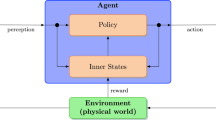Abstract
Since the availability of ChatGPT, there has been a heated debate about what conclusions should be drawn from this automated text generation. This paper: There is an ethical claim that the authors vouch for the quality of their sources. The realization of this claim is tied to explicit competence, in this case, information literacy. However, when using autonomous writing programs, this competence is shared: The user leaves the source responsibility to the AI. This delegation can only succeed when the machine itself has information competence. This point has ethical implications for the use and development of such technology. If the adage “one bad apple spoils the whole barrel” is true, then the ability to distinguish good apples from bad is a core information literacy skill. This paper discusses what information ethics requirements must be placed on the programming and use of autonomous writing programs.
Access this chapter
Tax calculation will be finalised at checkout
Purchases are for personal use only
Similar content being viewed by others
References
Baidoo-Anu, D., Owusu Ansah, L.: Education in the Era of Generative Artificial Intelligence (AI): Understanding the Potential Benefits of ChatGPT in Promoting Teaching and Learning (2023). https://ssrn.com/abstract=4337484
Mattas, P.S.: ChatGPT: a study of AI language processing and its implications. Int. J. Res. Publ. Rev. 4(2), 435–440 (2023)
Zhuo, T.Y., Huang, Y., Chen, C., Xing, Z.: Red teaming ChatGPT via Jailbreaking: Bias, Robustness, Reliability and Toxicity (2023). https://doi.org/10.48550/arXiv.2301.12867
Lund B.D., Wang, T.: Chatting about ChatGPT: How May AI and GPT Impact Academia and Libraries? Library Hi Tech News (2023). https://doi.org/10.1108/LHTN-01-2023-0009
Krügel, S., Ostermaier, A., Uhl, M.: The Moral Authority of ChatGPT (2023). https://doi.org/10.48550/arXiv.2301.07098
Bruneault, F., Laflamme, A.S.: AI Ethics: how can information ethics provide a framework to avoid usual conceptual pitfalls? Overview AI Soc. 36, 757–766 (2021)
Raunak, V., Menezes, A., Junczys-Dowmunt, M.: The Curious Case of Hallucinations in Neural Machine Translation. CoRR abs/2104.06683 (2021). https://doi.org/10.48550/arXiv.2104.06683
Hintze, A.: Understanding the Four Types of AI, from Reactive Robots to Self-Aware Beings. The Conversation (2016). https://theconversation.com/understanding-the-four-types-of-ai-from-reactive-robots-to-self-aware-beings-67616
Kreis, M.: Leben, Arbeit, Bildung 2035+. Durch Künstliche Intelligenz beeinflusste Veränderungen in zentralen Lebensbereichen [Life, Work, Education 2035+. Changes in Key Areas of Life Influenced by Artificial Intelligence] (Zukunftsstudie Münchner Kreis [Future Study Munich Group], vol. VIII). Munich (2020). https://www.bertelsmann-stiftung.de/de/publikationen/publikation/did/zukunftsstudie-leben-arbeit-bildung-2035
Turing, A.M.: Computing machinery and intelligence. Mind 59, 433–460 (1950)
Mollick, E.: AI Is Not Good Software. It Is Pretty Good People. A Pragmatic Approach to Thinking about AI. One Useful Thing (2023). https://www.oneusefulthing.org/p/ai-is-not-good-software-it-is-pretty
Jobin, A., Ienca, M., Vayena, E.: Artificial intelligence: the global landscape of ethics guidelines. Nat. Mach. Intell. 1, 389–399 (2019)
Felzmann, H., Villaronga, E.F., Lutz, C., Tamò-Larrieux, A.: Transparency you can trust: transparency requirements for artificial intelligence between legal norms and contextual concerns. Big Data Soc. 6(1), 1–14 (2019). https://doi.org/10.1177/2053951719860542
Courtenage, S.: Intelligent Machines, Collectives, and Moral Responsibility. AI Ethics (2023). https://doi.org/10.1007/s43681-023-00285-6
Habermas, J.: The Theory of Communicative Action. Vol. 1: Reason and the Rationalization of Society. Polity Press, Cambridge, UK (1984)
Habermas, J.: Theorie des kommunikativen Handelns. Bd. I: Handlungsrationalität und gesellschaftliche Rationalisierung [The Theory of Communicative Action. Vol. I: Reason and the Rationalization of Society]. Suhrkamp, Frankfurt (1981)
Rath, M.O.: Authentizität als Eigensein und Konstruktion – Überlegungen zur Wahrhaftigkeit in der computervermittelten Kommunikation [Authenticity as Selfhood and Construction – Reflections on Sincerity in Computer-Mediated Communication]. In: Emmer, M., Filipović, A., Schmidt, J.-H., Stapf, I. (eds.) Echtheit, Wahrheit, Ehrlichkeit. Authentizität in der Online-Kommunikation [Realness, Truth, Honesty. Authenticity in Online Communication], pp. 16–27. Juventa, Munich (2013)
Weinert, F. E.: Concept of Competence: A Conceptual Clarification. In: Rychen, D.S., Salganik, L.H. (eds.) Defining and Selecting Key Competencies, pp. 45–65. Hogrefe & Huber Publishers, Cambridge MA. (2001)
Rath, M.O.: Ethik der mediatisierten Welt. Grundlagen und Perspektiven [Ethics of the Mediatized World. Fundaments and Perspectives]. VS, Wiesbaden (2014)
Pavlik, J.V.: Collaborating with ChatGPT: considering the implications of generative artificial intelligence for journalism and media education. J. Mass Commun. Educ. 78(1), 84–93 (2023)
Walmsley, J.: Artificial intelligence and the value of transparency. AI Soc. 36(2), 585–595 (2020). https://doi.org/10.1007/s00146-020-01066-z
de Haan, Y., van den Berg, E., Goutier, N., Kruikemeier, S., Lecheler, S.: Invisible Friend or Foe? how journalists use and perceive algorithmic-driven tools in their research process. Digit. J. 10, 1775–1793 (2022)
Dastin, J.: Amazon Scraps Secret AI Recruiting Tool that Showed Bias against Women. Reuters (2018). https://www.reuters.com/article/us-amazon-com-jobs-automation-insight-idUSKCN1MK08G
Victor, D.: Microsoft Created a Twitter Bot to Learn from Users. It Quickly Became a Racist Jerk. New York Times (2016). https://www.nytimes.com/2016/03/25/technology/microsoft-created-a-twitter-bot-to-learn-from-users-it-quickly-became-a-racist-jerk.html?smid=url-share
Zemčík, T.: Failure of chatbot tay was evil, ugliness and uselessness in its nature or do we judge it through cognitive shortcuts and biases? AI Soc. 36, 361–367 (2021)
Wolf, M.J., Miller, K., Grodzinsky, F.S.: Why we should have seen that coming: comments on microsoft’s Tay “Experiment”, and wider implications. ACM SIGCAS Comput. Soc. 47(325), 54–64 (2017)
Marks, J.: Why be Against Darwin? creationism, racism, and the roots of anthropology. Am. J. Phys. Anthropol. 149(Suppl 55), 95–104 (2012)
Author information
Authors and Affiliations
Corresponding author
Editor information
Editors and Affiliations
Rights and permissions
Copyright information
© 2024 The Author(s), under exclusive license to Springer Nature Switzerland AG
About this paper
Cite this paper
Rath, M.O. (2024). To Find the “Rotten Apple” – Information Ethical Requirements for the Information Literacy of Autonomous Writing Engines. In: Kurbanoğlu, S., et al. Information Experience and Information Literacy. ECIL 2023. Communications in Computer and Information Science, vol 2043. Springer, Cham. https://doi.org/10.1007/978-3-031-52998-6_11
Download citation
DOI: https://doi.org/10.1007/978-3-031-52998-6_11
Published:
Publisher Name: Springer, Cham
Print ISBN: 978-3-031-52997-9
Online ISBN: 978-3-031-52998-6
eBook Packages: Computer ScienceComputer Science (R0)




